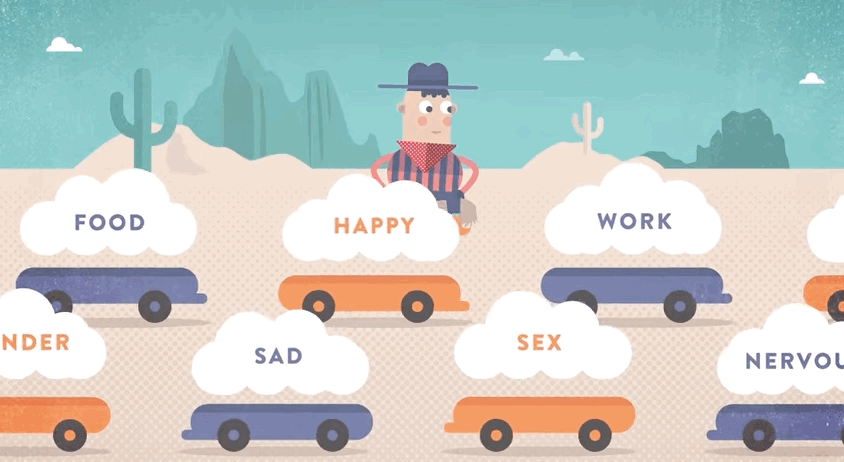Spoiler: It literally changes.
is hardly a new topic of conversation. But, there’s still plenty that remains unknown to most about the practice of training the mind, including the effect it can have on the brain.
Headspace / Via youtube.com
While many people still associate meditation with the art of “thinking about nothing” it is actually the opposite, according to Dr. Craig Hassed, a senior lecturer at Monash Medical Faculty.
“All meditation practices involve training attention but also training the attitude of acceptance and non-reactivity, as well as attention on the breath and the body,” Hassed tells BuzzFeed Life.
So, rather than thinking about nothing, real meditation practice is about properly acknowledging all of our thoughts, training our brain out of its default setting of letting life pass by.
And if you practice meditation regularly, researchers believe that it can have wonderful effects on your brain. Here’s what might happen:
First, you should understand: Your brain can change and grow throughout your life.

CBS / Via weheartit.com
This is called neuro-plasticity, and it’s a relatively new buzzword in the field of neuroscience.
“The way that scientists used to think about the brain, until recent times, was that the brain wires itself in early development and early childhood, then after that, the only thing that happens to the brain is that it loses cells as we get older,” Hassed says.
But recent research has poked big holes in that theory. Neuroscientists now know that you actually can teach an old brain new tricks.
“Today we know that our brains are changing all the time. Most changes take place on the micro-anatomical level and are very short-lived — so it is harder to measure them — but some changes even take place on the macro-anatomical level and can be captured by modern imaging technologies, such as MRI,” Eileen Luders, Ph.D, Assistant Professor at UCLA School of Medicine Department of Neurology, tells BuzzFeed Life.
Some research shows that meditation is associated with a change to the amount of grey matter in the brain, which is a pretty big deal.
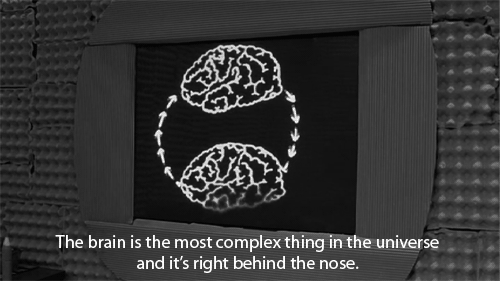
Partizan Films / Via giphy.com
But, what even is grey matter — and why is it so impressive that it can change?
“When people talk about grey matter, they’re talking about cells — the brain cells that connect to each other,” Hassed says. “When a person learns a particular skill — like meditation — they’re exercising those areas of grey matter, whose job it is to form that skill.” Like you notice muscle gain after physical exercise, research shows that meditation may stimulate the growth of new brain cells — which means more measurable grey matter in certain areas of the brain.
Beyond reported differences in grey matter between meditators and people who don’t practice, meditation has also been associated with a slowdown in the natural loss of grey matter, which occurs with aging. “In our latest study, we extended our focus of research by looking at the potential impact of aging on the brain, specifically the impact of aging on the brain’s grey matter. Again, our analysis revealed a striking difference between meditators and controls: meditators’ brains seem to be much less affected by the normal, natural age-related gray matter decline,” Luders says.
What this means: People who meditate regularly may slow down their brain’s aging process. Go meditation!
Meditation has also been linked to changes in the hippocampus, the part of the brain responsible for forming memories and spatial awareness.
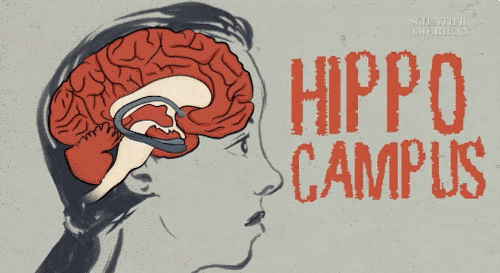
Via youtube.com
A 2011 study compared the brains of people who meditated for about 40 minutes each day with the brains of demographically-matched people who didn’t meditate at all.
Brain scans revealed that there were some areas of the meditator’s brains with more grey matter — and one of these areas was the hippocampus.
The same study also compared the brains of non-meditators to those who had just undergone an eight week meditation program, finding the same results.
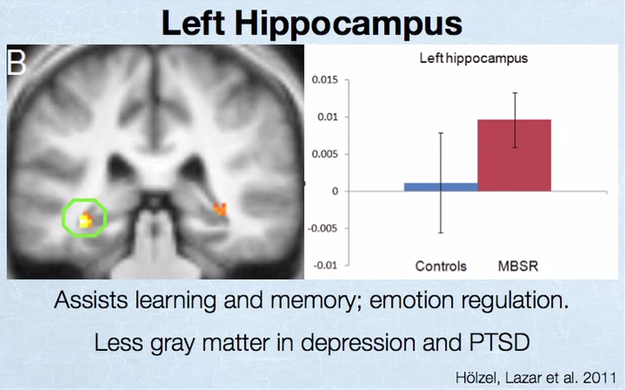
This area of the brain, responsible for converting short-term memories into long-term memories, is pretty important — so extra grey matter in the area is something to get excited about.
Here’s a guess as to why meditation may impact the hippocampus in this way: “When we’re not paying attention, the memory centre is offline, so we don’t remember things,” Hassed says. “When a person is continually and regularly paying attention to what is going on around them (read: bring mindful through meditation) the hippocampus is being engaged, so in the long-term a healthier memory centre is the result.”
Meditation also is linked to brain cell growth in your pre-frontal cortex — the part of your brain responsible for decision-making and good judgment.
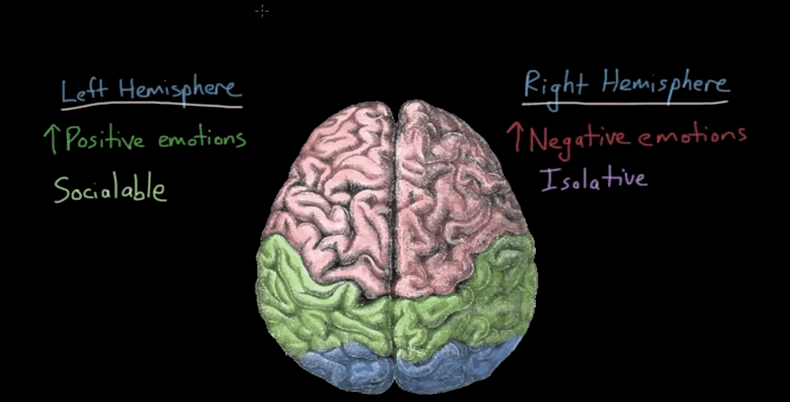
Via youtube.com
Right behind the forehead, the pre-frontal cortex is responsible for everything from deciding between right and wrong to analysing situations to a person’s abstract thought. According to Hassed, this is another area of the brain that sees thicker grey matter among those who meditate regularly.
While some parts of the brain appear to grow with meditation practice, the amygdalas of people who meditate is typically smaller than average. But that’s a good thing.
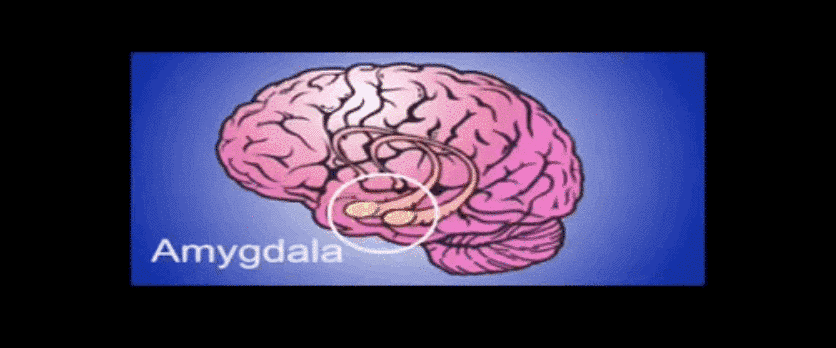
Via youtube.com
“If you’re trying to get away from a tiger or a shark, your amygala will fire off; it triggers that fight of flight response. It’s the stress centre,” says Dr Hassed.
Obviously it’s important to have a working stress centre, but the trouble arises when the amygdala is firing for no reason, which is what happens when a person is chronically anxious and stressed — as many people are. As meditation calms the mind, it in turn may calm the amygdala, reducing its activity. Like other areas of the brain appear to grow with increased activity, grey matter in the amydgala seems to shrink the more a person meditates, allowing mindfulness and reasonable thoughts to flow freely. This change also goes deeper than grey matter, down to the DNA cells in the brain, switching off stress genes that are unnecessarily present, Hassed says.
Meditation may literally be brain-changing. And it only takes a small amount each day to make a difference.

“A person can start to see significant difference with mindfulness meditation, practicing for five minutes a couple of times a day, but if a person does more practice, then the person is going to get more benefit — it’s the same thing as exercise,” Hassed says.
So, there you have it: the human brain is changeable, and research shows that meditation might be able to make it bigger AND smaller in important ways.

Go and think about that. Then meditate.










